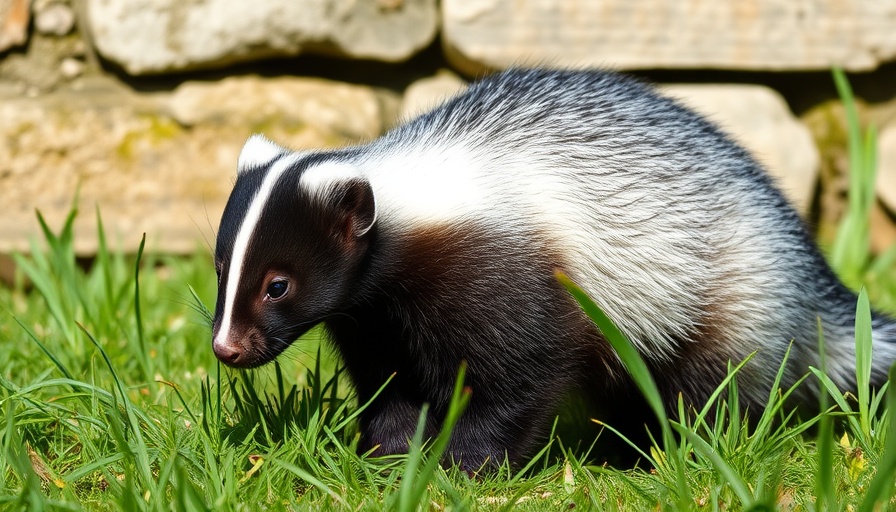
Skunk Encounters: More Common Than You Think
Little do many homeowners know, skunks are rather common guests in our yards—especially as the seasons change. These nocturnal critters thrive in suburban environments, often making homes beneath decks or porches. If you've spotted circular depressions in your lawn or caught a whiff of that infamous odor, it’s a sign they may have set up camp too close for comfort. Understanding the habits and preferences of these creatures can arm you with the necessary knowledge to take measures against unwanted skunk visits.
Know the Signs: Identifying Skunk Activities
The first step in keeping your yard skunk-free is to recognize their presence. Look for telltale signs such as small, conical holes in your garden, which are skunks’ attempts to forage for their favorite food—grubs. On particularly warm evenings, watch for their characteristic outline as they scuttle around. Skunks are more active during the twilight hours and can roam around freely if they feel safe and protected.
Creating Barriers: How to Secure Your Property
Effective skunk prevention involves proactive steps to limit access and appeal. Consider installing underground fencing around vulnerable structures like porches, decks, and sheds. A barrier several inches underground will thwart even the most determined digger. Additionally, make sure any foliage or structures in your yard that might provide cover are well-maintained and organized.
Food Sources: A Skunk's Weakness
Did you know that skunks are opportunistic eaters? This means they’re attracted to any potential food sources. To deter these furry foragers, securely store all outdoor pet food, seal garbage cans tightly, and clean up leftover scraps after outdoor meals. Even fallen fruits from trees can tempt these pests, so keeping your yard clean is essential to avoid unwanted visits.
Defensive Measures: Utilizing Motion Detection
While skunks are primarily nocturnal, they can become accustomed to their surroundings quickly. Thus, employing motion-sensor lighting can disrupt their natural routines. Sudden blares of bright light can dissuade them from feeling comfortable enough to roam freely. But, like all good strategies, results may vary as skunks can sometimes show remarkable bravado.
Natural Deterrents: Spicy Solutions to Try
If you want to take a more natural approach, consider capsaicin-based repellents, which is derived from chili peppers. This safe but potentially unappetizing substance can be applied in granule or liquid form around the yard, effectively using taste and smell to keep skunks away. The good news? It isn't harmful to them—just unappealing!
When to Call in the Professionals
If you observe consistent skunk behaviors or believe a family has moved into your yard, seeking professional help may be best. Wildlife experts can evaluate the situation and assess any potential offspring in lodges, ensuring the skunks are handled humanely and effectively. Tampering with a den yourself could lead to accidental skunk sprays—a risk few want to take!
Final Thoughts: Wisdom for Skunk-Free Living
While skunks are often viewed as pesky intruders, their presence can inspire more ecological awareness. They play a vital role in controlling pest populations in gardens and yards. Nevertheless, when they're too close for comfort, modifying the environment to suit both parties is essential. So adopt these strategies, create a skunk deterrence plan, and keep your yard both an inviting and secure sanctuary.
Now that you’re equipped with this information, it’s time to spring into action and safeguard your outdoor space from those unwelcome visitors. You'll be amazed at how conservation and prevention can coexist in harmony!
 Add Row
Add Row  Add
Add 



Write A Comment